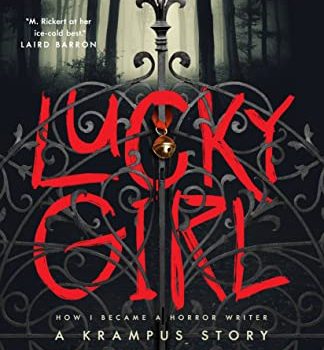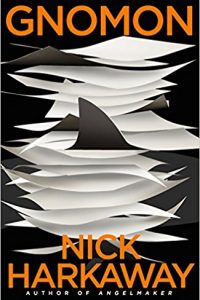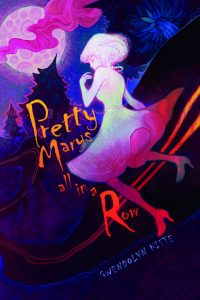Gary K. Wolfe Reviews Lucky Girl: How I Became a Horror Writer: A Krampus Story by M. Rickert
 Lucky Girl: How I Became a Horror Writer: A Krampus Story, M. Rickert (Tordotcom 978-1-250-81733-4, 110pp, tp; -81734-1, $4.99, ebook) September 2022.
Lucky Girl: How I Became a Horror Writer: A Krampus Story, M. Rickert (Tordotcom 978-1-250-81733-4, 110pp, tp; -81734-1, $4.99, ebook) September 2022.
M. Rickert has long demonstrated her skill in managing the venerable tradition of tales nested within tales in such brilliantly constructed stories as ‘‘Journey Into the Kingdom’’ and ‘‘Cold Fires’’ (not to mention last year’s The Shipbuilder of Bellfairie). Her new novella Lucky Girl, which bears the dual subtitles ‘‘How I Became a Horror Writer’’ and ‘‘A Krampus Story’’, continues not only that tradition, but the equally venerable traditions of club stories and really creepy Christmas tales. I’ve seen Rickert compared to writers such as Robert Aickman and Shirley Jackson (she’s won a Jackson award and been nominated four other times), which is a way of saying she’s one of those writers for whom the term horror doesn’t quite fit, and doesn’t quite not.
Lucky Girl is a club story in the sense that five lonely strangers who meet at a seedy diner decide to spend Christmas together, and later make an annual tradition of it. During their first meeting they decide to swap Christmas stories, the most dramatic of which is told by the comparatively well-off Grayson, who recalls confronting the Christmas demon Krampus in an old chapel on his ancestral estate. In keeping with the club story tradition, Grayson narrates in the arch cadences of a late Victorian ghost tale that could have come from Le Fanu or M.R. James: ‘‘That Christmas Eve, I awoke with the light of a full moon fallen across my pillow and, summoned to my window by a strange noise, observed a figure walking across our yard.’’ Years later, the narrator Roanoke (a name redolent with loss and disappearance, weirdly appropriate since she lost her family in a home massacre when she was a teenager) is a successful horror novelist, Grayson is a wealthy ‘‘tea baron,’’ two other members of the group have gotten married, and another has become a sort of New Age social media influencer. Invited to spend a holiday at the same luxurious family estate where Grayson’s Krampus adventure supposedly occurred, the group reunites, and Roanoke begins to piece together the threads that connect all their stories (including Roanoke’s own murdered family). Like the best of Rickert’s darkly Gothic tales, the atmosphere is one of perfectly distilled dread, the narrative far more complex than it at first seems, and by the end of this tightly packed and elegantly told novella we feel as though we’ve read a much longer and quite haunting novel.
Gary K. Wolfe is Emeritus Professor of Humanities at Roosevelt University and a reviewer for Locus magazine since 1991. His reviews have been collected in Soundings (BSFA Award 2006; Hugo nominee), Bearings (Hugo nominee 2011), and Sightings (2011), and his Evaporating Genres: Essays on Fantastic Literature (Wesleyan) received the Locus Award in 2012. Earlier books include The Known and the Unknown: The Iconography of Science Fiction (Eaton Award, 1981), Harlan Ellison: The Edge of Forever (with Ellen Weil, 2002), and David Lindsay (1982). For the Library of America, he edited American Science Fiction: Nine Classic Novels of the 1950s in 2012, with a similar set for the 1960s forthcoming. He has received the Pilgrim Award from the Science Fiction Research Association, the Distinguished Scholarship Award from the International Association for the Fantastic in the Arts, and a Special World Fantasy Award for criticism. His 24-lecture series How Great Science Fiction Works appeared from The Great Courses in 2016. He has received six Hugo nominations, two for his reviews collections and four for The Coode Street Podcast, which he has co-hosted with Jonathan Strahan for more than 300 episodes. He lives in Chicago.
This review and more like it in the October 2022 issue of Locus.
 While you are here, please take a moment to support Locus with a one-time or recurring donation. We rely on reader donations to keep the magazine and site going, and would like to keep the site paywall free, but WE NEED YOUR FINANCIAL SUPPORT to continue quality coverage of the science fiction and fantasy field.
While you are here, please take a moment to support Locus with a one-time or recurring donation. We rely on reader donations to keep the magazine and site going, and would like to keep the site paywall free, but WE NEED YOUR FINANCIAL SUPPORT to continue quality coverage of the science fiction and fantasy field.
©Locus Magazine. Copyrighted material may not be republished without permission of LSFF.







